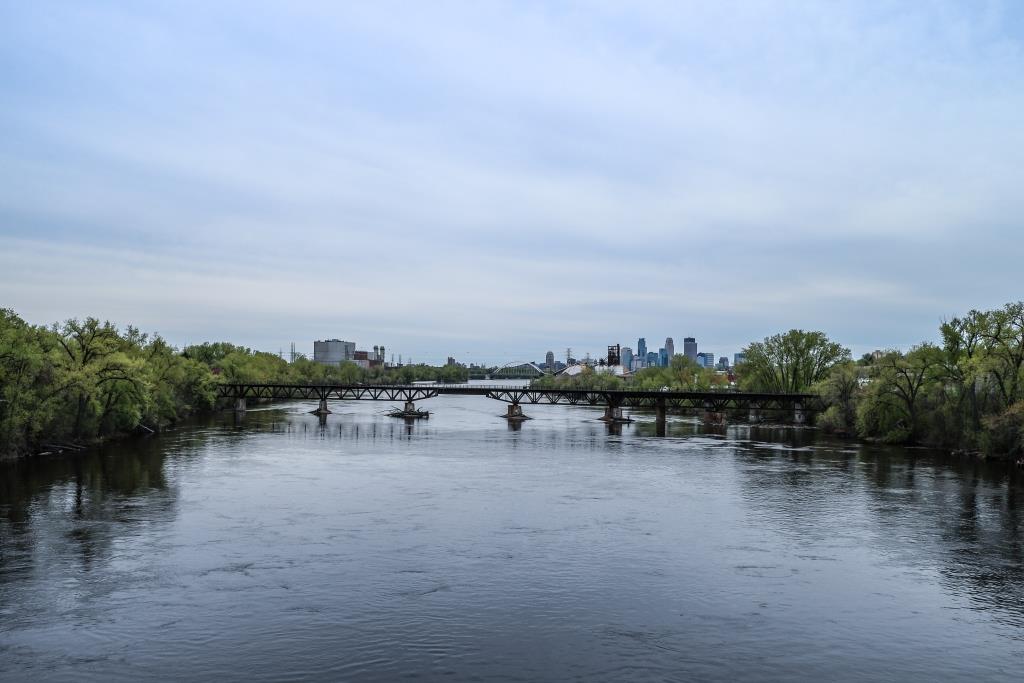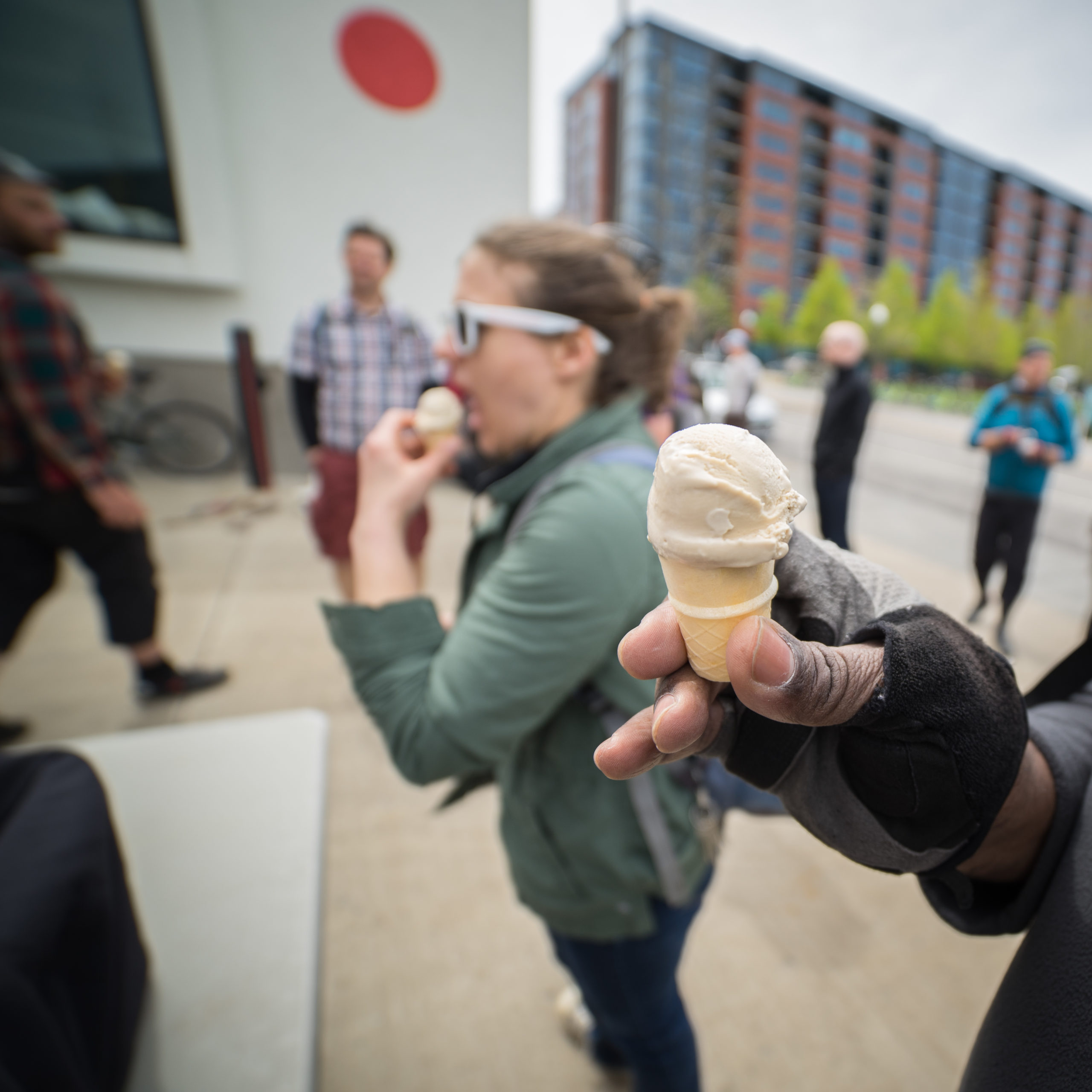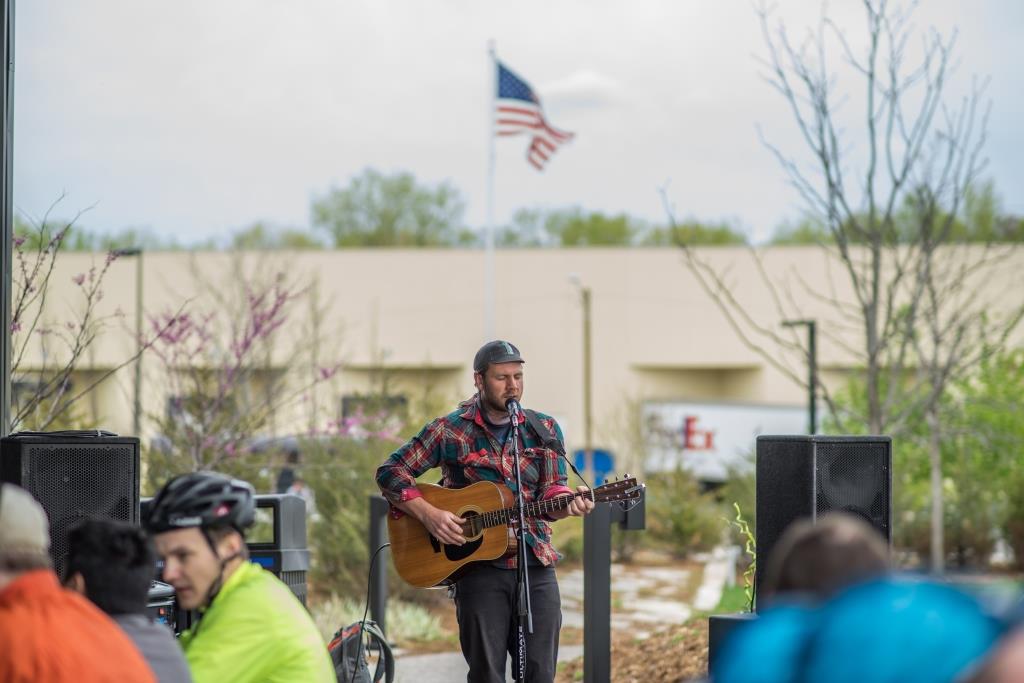Ramble Ramble: Shall We Cross, Beer and Water
Ben Weaver reflects on the last of "30 Days of Biking," and on the tangled questions of water, beer, and the how and why of what we "consume" in the world around us

On the last day of April, I led the concluding ride for 30 Days of Biking. In roughly 25 miles, our group of about 60 riders rambled up and then back down the river, making a handful of stops, most notably to participate in a river clean-up near the Columbia Park neighborhood, where St. Anthony Parkway meets the Mississippi. Then to Izzy’s ice cream to try a new flavor that owner Jeff Sommers made in collaboration with Bent Paddle Beer especially for us. The ride ended at Surly Brewery, where I gave a performance.What follows is a piece written from reflections I had as we rode that day and questions that have occurred to me before, during, and since the event.
A rusty refrigerator in the river. Out waiting with the stars. Shall we cross? The night wind blowing through the highest leaves. The sky is horsehair and cottonwood.
It takes approximately three to four gallons of water to make one gallon of beer. It takes more water to grow the hops, and still more water to malt the barley. The lines are branching.
How many wildflowers can you name? What about trees? Birds? If you knew their names would you begin to notice them more often? Would you care for them differently? Do you greet strangers?
The poetry of rivers, rain, trees, mountains, clouds, animal beaks and claws is not measurable. It shapeshifts. The lost valley is calculated by the birds that once built nests there, the buffalo who came and went.
What happens to the two or three gallons of water that does not become beer? It goes back to the city where it is cleaned by the wastewater treatment plant. How often do you think about wastewater when you drink beer?
This spring has been incredibly windy. Each spring seems to get windier. It is not absurd to consider the possibility that the wind could carry emotion. It picks up leaves and pieces of dirt, fur, trash. It blows through all of us. It picks up whatever is on the land. Water behaves similarly.
Is water supply the same as water treatment? How many breweries can one city support? We talk about sustainability a lot these days, but exactly what kinds of lives are we trying to sustain? Do we consider the lives of others when we think of what is best for our own?
Sometimes we cook sausages over a fire in our backyard—chop potatoes and wrap them up in foil with olive oil and garlic, toss them on the coals. Sometimes, we also do this down by the river. Next time you cross the Lake Street bridge between Saint Paul and Minneapolis, look upstream. There used to be an island there.
If you pick up trash in the woods, will you be discouraged the next time you are in those same woods and discover more trash that needs picking up? How long will we have to keep picking up other people’s trash?
One day last week, I was sitting in a cafe. I heard someone say “like” no fewer than 17 times in the space of one minute. What is happening to our language? Have we come to rely on irony as a tool for escaping the responsibility we owe to own our feelings?
Wasps built a nest in the cornice of our neighbors garage. Maybe true silence is when you hear your own blood rush. I refuse to look away.
How far can a duck fly before it needs to stop and rest? When it does stop to rest, where does it stop? Where is your nearest wetland?

Surly Brewery gets its water from the Jordan Aquifer. This aquifer touches seven states. Last year, Surly served roughly 41,000 hamburgers. The pasture grasses turned green from the rain and sun. The cattle ate it. Where does your drinking water comes from?
If we want to change the way we live, we will need to occupy the heartbeat of that struggle. We will have to stay awake when others are sleeping. We will be faced with choices. And to make those choices, we will have to think. To think, we will have to access wisdom. We will have to talk to people who have different ideas than we do.
Our ancestors spent more time sleeping on the ground than they did in beds. To camp, do you have to be in a campground? Sometimes we sleep on the dirt in our backyard. With or without a tent. When we do, we wake up early to birds.
If you get rained on, it’s only a matter of time until you are dry again.
Is it easier to walk in the woods with children, making up games and stories to keep their attention, or to take them to disneyland? (I refuse to capitalize “disneyland.”) There are different types of distractions, those we create and those we must manage. Which would you rather invest your energy in?
It is a challenge to get away from signs, even in our national, state, and county parks. The places we think of as wild are, in fact, highly managed. Does this mean wildness is endangered? Do we always need to know where we are going? What does it mean to be lost? What does it mean to pay attention? When is the last time you went somewhere unfamiliar without a map?

If we want to change the way we live, we will need to occupy the heartbeat of that struggle. We will have to stay awake when others are sleeping. We will be faced with choices. And to make those choices, we will have to think. To think, we will have to access wisdom; we will have to talk to people who have different ideas than we do. We might not agree with them, but we will still need to work together. The wind will fill the gutters with leaves. Do we still want to change?
Each mending patch holds a memory. New Orleans. The Sunflower River. This road or that road. Maybe we should not focus on what separates us from all other living things, but on what connects us. It’s a vast capacity to wonder. Is our logic logical when considering the preservation of life?
This winter, there were record floods along the lower Mississippi River. It wasn’t widely reported. Many towns suffered significant damage. Some towns were saved by their levees. Local officials were heard saying, “The levees were expensive, but they were worth it. We beat old man river again!” Why do we think of old man river as someone to beat? Why do we build our homes in floodplains? Do we walk around looking for wars? It is a river’s nature to flood. In order to be healthy, it must. Why do we try and contain what does not wish to be contained? Why do we restrain what wants to fluctuate? Are “jobs” the only way to make a living?
Once, a man built a small cabin in the woods and asked, “What if we filled our accounts with song, made our trade with the stars, created enterprise with learning the nature of storms, and sank our capital into following rivers?”
There was a knock at the door. I heard blues in the sycamore. Talked to the wolf, and the wolf talked back. Watched the tadpoles swimming in rainwater and found my true love.
Are we becoming poor because of our addiction to comfort and privilege?
I was reading my son a story. He interrupted to say, “I am a bird, and she is a bird, and we live in a birdhouse.” Is what we consume consuming our creativity, our earth?
Water is being drawn from the aquifers faster than it can be recharged. This is not a restaurant review. This is a birdhouse. We cannot drink beer without considering water. There is a connection between controlling the Mississippi River through levees and the 6.5 thousand-square-mile dead zone in the Gulf. I want to see what will be shaken from the trees.
Northern spotted owl, wild petunia, crooked aster, eastern hemlock, tamarack, and wood turtles.
How do we want to answer these questions? What happens if we answer them together?